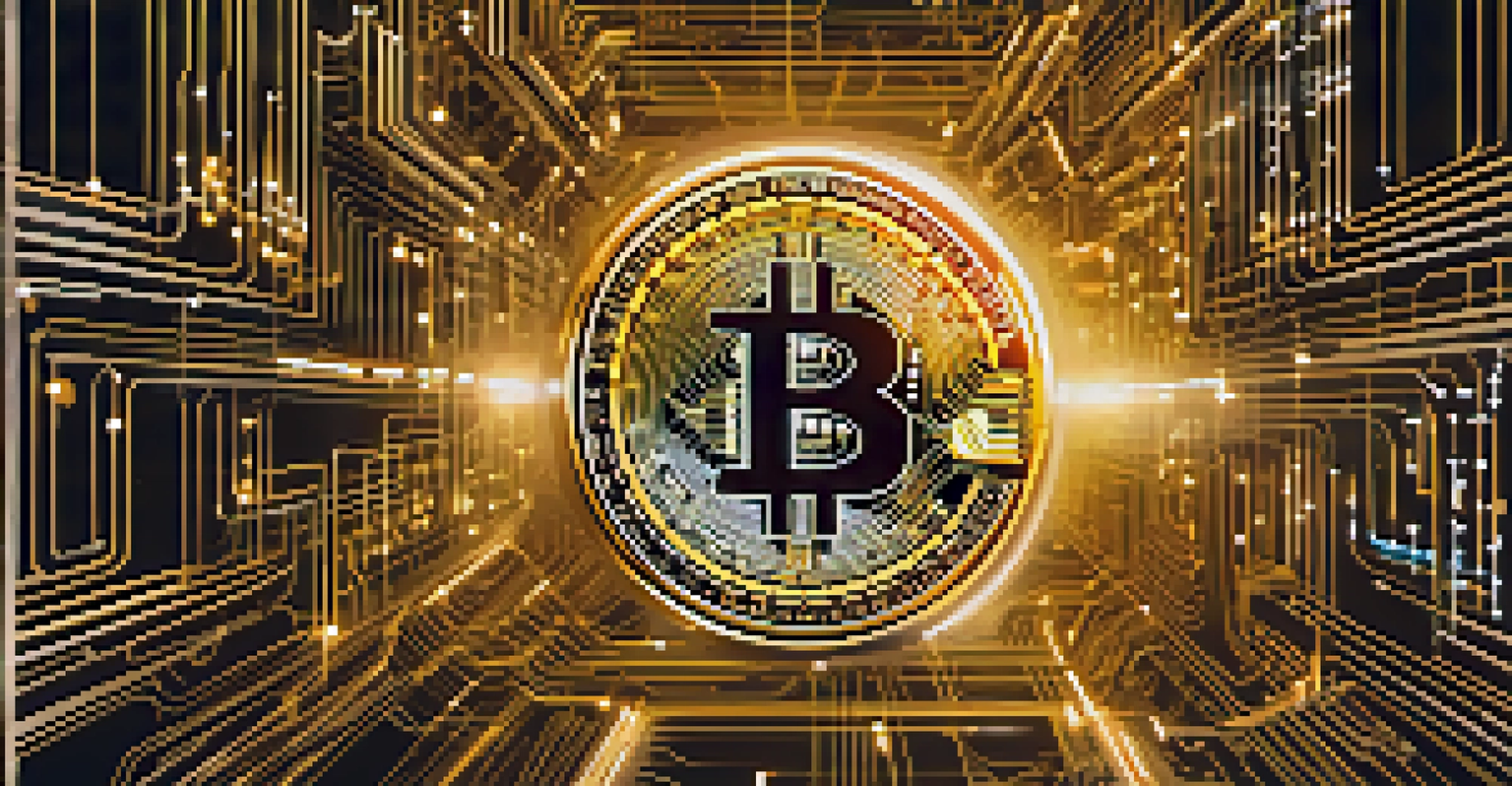Bitcoin Mining: Mechanisms, Challenges, and Future Outlook

What is Bitcoin Mining? An Introduction to the Basics
Bitcoin mining is the process of validating and adding transactions to the Bitcoin blockchain. It involves solving complex mathematical problems to ensure the integrity of the network. Miners use powerful computers to compete against each other, and the first one to solve the problem gets to add a new block to the blockchain and is rewarded with newly minted bitcoins.
Bitcoin mining is not just about creating new coins; it's about securing the network and validating transactions.
Think of it as a digital lottery where miners are ticket holders, racing to solve a puzzle. This process not only secures transactions but also introduces new bitcoins into circulation, keeping the ecosystem alive. Without mining, Bitcoin would lack its decentralized nature and security framework.
Related Resource
In essence, mining is crucial for Bitcoin's functionality, acting as both a transaction validator and a way to regulate the supply of new bitcoins. This dual role is what makes mining a cornerstone of the entire cryptocurrency system.
How Does Bitcoin Mining Work? The Mechanisms Explained
At its core, Bitcoin mining relies on a mechanism called Proof of Work (PoW). This requires miners to solve cryptographic puzzles, which are computationally intensive and time-consuming. The difficulty of these puzzles adjusts every 2016 blocks to ensure that new blocks are added approximately every ten minutes, regardless of the number of miners active at any time.

Once a miner successfully solves the puzzle, they broadcast the solution to the network. Other miners then verify this solution, ensuring that it is correct before the new block is added to the blockchain. This consensus mechanism helps prevent double-spending and keeps the network secure.
Bitcoin Mining: Validation Process
Bitcoin mining validates transactions and ensures the integrity of the blockchain through complex problem-solving.
In simpler terms, think of PoW as a race where miners must prove their work before they can claim victory. This not only adds a layer of security but also incentivizes miners to act honestly, as any malicious activity would be economically disadvantageous.
The Role of Miners: Validators, Securing the Blockchain
Miners play a pivotal role in the Bitcoin ecosystem by validating transactions and maintaining the blockchain's integrity. Each time a transaction occurs, miners ensure that the sender has enough balance and that the transaction follows the network's rules. This validation process is crucial in preventing fraud.
The future of Bitcoin mining will depend on the ability to adapt to new technologies and embrace sustainable practices.
In a world where digital transactions are becoming the norm, having a decentralized and secure validation system is paramount. Miners, therefore, act as gatekeepers, ensuring that every transaction is legitimate before it gets recorded on the blockchain.
Related Resource
So, you can think of miners as the referees in a game, making sure that everyone plays by the rules. Their diligence helps build trust in the system, allowing users to engage in transactions with confidence.
Challenges Facing Bitcoin Mining Today
While Bitcoin mining has its benefits, it also faces significant challenges. One of the primary concerns is the enormous amount of energy required to power the mining operations. As more miners join the network, the difficulty of solving puzzles increases, leading to higher energy consumption and environmental concerns.
Additionally, the competitive nature of mining means that miners must invest in increasingly powerful hardware to remain profitable. This has led to a scenario where only those with substantial capital can compete effectively, raising questions about the decentralization of the mining process.
Challenges of Mining Sustainability
The significant energy consumption and hardware costs associated with Bitcoin mining raise concerns about its environmental impact and decentralization.
In essence, the challenges of Bitcoin mining mirror the complexities of modern technology, where sustainability and equity are ongoing debates. Addressing these issues is crucial for the long-term viability of Bitcoin mining.
Environmental Impact of Bitcoin Mining: A Growing Concern
The environmental impact of Bitcoin mining cannot be overlooked. Critics argue that the vast energy consumption associated with mining contributes to carbon emissions and exacerbates climate change. Reports have shown that Bitcoin mining can use as much energy as some small countries.
However, it's also worth noting that many miners are exploring renewable energy sources to mitigate their carbon footprint. For instance, some mining operations are now powered by solar or wind energy, aiming to strike a balance between profitability and sustainability.
Related Resource
Thus, while the environmental concerns are valid, there's also a growing movement within the industry to adopt greener practices. The future of Bitcoin mining may very well depend on its ability to transition toward more sustainable energy solutions.
The Future of Bitcoin Mining: Trends and Innovations
Looking ahead, the future of Bitcoin mining is likely to be shaped by advancements in technology and shifts in regulatory frameworks. Innovations in mining hardware, such as more energy-efficient ASICs (Application-Specific Integrated Circuits), could help reduce overall energy consumption while maintaining competitiveness.
Moreover, as governments and regulatory bodies become more involved, the landscape could change dramatically. Regulations aimed at ensuring sustainability and fair practices might emerge, influencing how mining operations are conducted.
Future Trends in Bitcoin Mining
Advancements in technology and evolving regulations will shape the future of Bitcoin mining, highlighting the need for adaptability and sustainability.
In this evolving scenario, adaptability will be key for miners. Those who can embrace new technologies and align with regulatory trends will not only survive but thrive in the dynamic world of Bitcoin mining.
Conclusion: Bitcoin Mining's Evolving Landscape
In conclusion, Bitcoin mining is a complex and multifaceted process that serves as the backbone of the cryptocurrency. While it presents challenges, particularly around energy consumption and decentralization, it also offers opportunities for innovation and sustainability.
As the industry continues to evolve, the balance between profitability and ecological responsibility will become increasingly important. Miners, developers, and regulators will need to work together to create an environment that fosters growth while addressing the pressing issues at hand.

Ultimately, the future of Bitcoin mining will depend on the collective efforts of all stakeholders involved, ensuring that it remains a viable and responsible element of the digital economy.